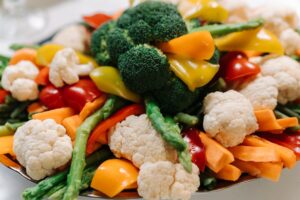Collagen, often referred to as the “glue” that binds the body together, is an essential protein for preserving skin, hair, nails, and joints, among other tissues. Collagen production declines with age, resulting in various symptoms of aging and joint problems. Including collagen-rich foods in your diet can be beneficial in combating this. This article will discuss 12 collagen-rich foods recommended by a dietitian to maintain a vibrant and healthy body.
1. Bone stock
Bone broth leads the list of foods abundant in collagen. By simmering animal bones, tendons, and ligaments, collagen, and other nutrients are released into the bouillon. Regular consumption can enhance the elasticity of the skin and the health of joints.
2. Turkey
Chicken is a versatile source of protein that contains collagen in its skin, tendons, and cartilage. When cooking, choose bone-in, skin-on pieces for a higher collagen content.
3. Fish
Collagen is present in the skin and bones of fish, particularly salmon and mackerel. Consuming these fish segments can contribute to your collagen consumption.

4. Beef
Collagen is abundant in beef, particularly in segments that contain connective tissue, such as sirloin and short ribs. Slow simmering these slices can facilitate the release of collagen, resulting in a savory and nutritious meal.
5. Pork
Pork is an additional source of collagen-rich flesh, particularly the skin and extremities. Slow-cooked pork dishes are a delicious way to add collagen to your diet.
6. Eggs
Eggs, specifically egg whites, are necessary for the right collagen production. Eggs provide the building elements necessary for the production of collagen in the body.
7. Fruits of Citrus
Vitamin C, which is vital for collagen synthesis, is abundant in citrus fruits like oranges, lemons, and limes. Consuming foods strong in vitamin C can aid the body’s natural collagen production.
8. Fruits
Berries, such as strawberries, blueberries, and raspberries, are rich in antioxidants that prevent oxidative injury to collagen. In addition, they contain vitamin C, which promotes healthy collagen levels.
9. Vegetables
The chlorophyll found in leafy greens such as spinach, kale, and Swiss chard may stimulate collagen production. In addition, they are abundant in vitamins and minerals that promote epidermis health.

10. Onion
Garlic is known for its anti-inflammatory properties and may aid in preventing collagen degradation. Including garlic in your diet can be a tasty method to promote collagen health.
11. Tomatoes
Tomatoes contain lycopene, an antioxidant that may prevent free radical injury to collagen fibers. In addition, they contain vitamin C, which supports collagen production.
12. Soy
Genistein is abundant in soy products such as tofu and soybeans. Genistein may increase collagen levels in the epidermis. Soybean consumption is associated with a healthier epidermis.
Tips for Maximizing Collagen Absorption
- Slowly cook collagen-rich foods: Slow cooking collagen-rich foods such as bone broth, stews, and braises facilitates collagen absorption by releasing it from the connective tissues.
- Combine Collagen Sources: Combining collagen-containing foods with those that are rich in vitamin C can improve collagen absorption and synthesis.
- Hydrate: Adequate hydration is crucial for collagen health. Consuming sufficient water helps maintain the structure and function of collagen in the body.
- Restrict Sugar and Processed Foods: A high sugar intake and consumption of processed foods can hasten collagen breakdown. These dietary modifications can help preserve collagen.
- Consider Collagen Supplements: If it is difficult to meet your collagen requirements through diet alone, collagen supplements are available in powders, capsules, and gels, among other forms.
Conclusion
Incorporating these collagen-rich foods into your diet and preserving a healthy lifestyle can improve skin elasticity, joint health, and overall health. As with any dietary adjustments, it is essential to consult with a healthcare professional or dietitian to ensure that your diet supports your unique health objectives. Remember that attaining and maintaining healthy skin and joints is a multifaceted process that involves diet, exercise, and overall lifestyle choices.
- Have you ever tried collagen supplements? What were your experiences?
If you enjoyed this blog post, share it with your friends!
